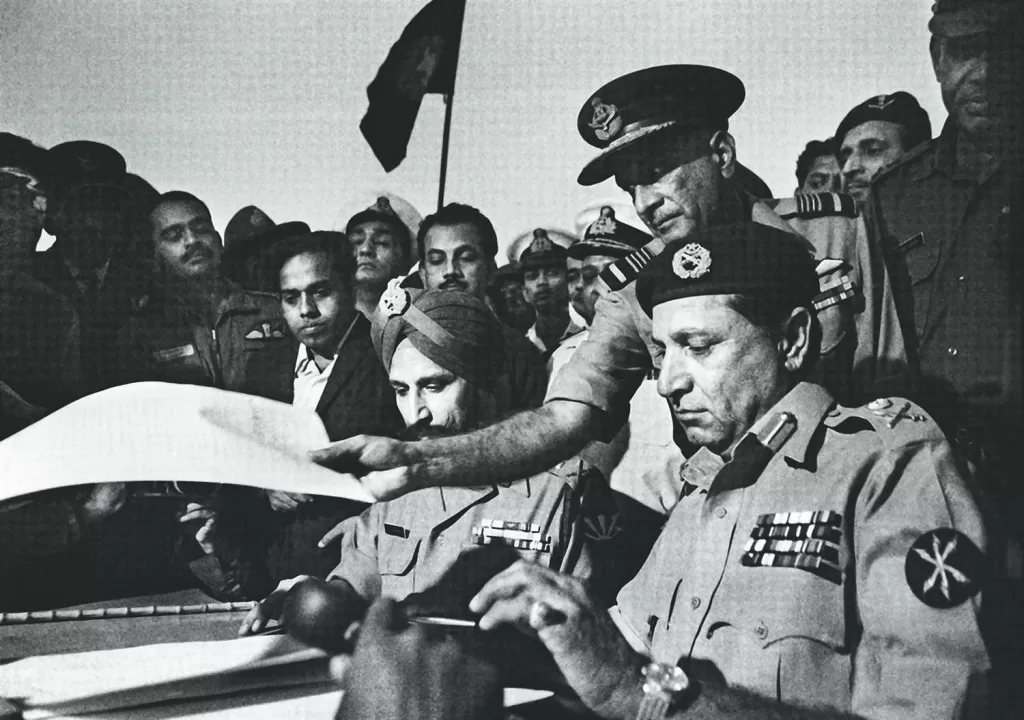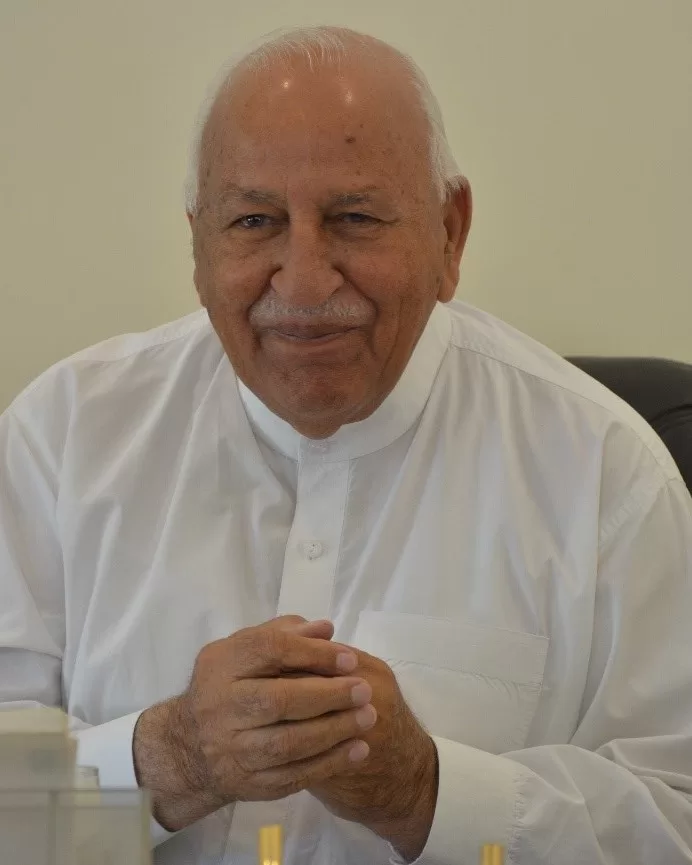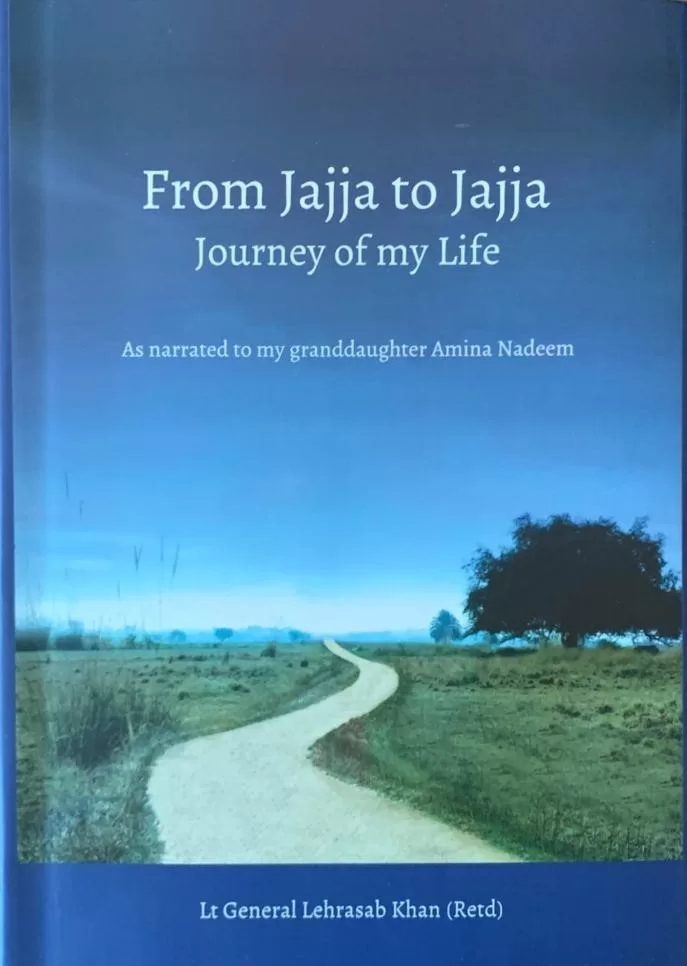“From Jajja to Jajja: Journey of My Life” is an autobiographical masterpiece penned by Lt Gen (R) Lehrasab Khan, HI(M), SJ, SBt, a seasoned Pakistan Army officer and dedicated philanthropist. This compelling book chronicles his life’s journey meticulously, from his early childhood through his formative school and college years, eventually leading to his rigorous training at the Pakistan Military Academy (PMA).
It subsequently delves into the illustrious career he carved as a distinguished Army officer, his pivotal role as the Secretary of Defense Production, and his transformative work as an educational philanthropist in his post-retirement phase.
The book presents a comprehensive and insightful portrayal of his life, artfully narrated in a simple yet captivating narrative style. What makes this memoir even more remarkable is the fact that it was narrated to his granddaughter, Amina Nadeem, who has adeptly captured and conveyed the essence of this extraordinary life journey.
Lt General (R) Lehrasab Khan initiates the book by exploring his childhood and his early educational journey, all against the backdrop of World War II, the Partition of the Subcontinent, and the early years of the newly born state of Pakistan after its independence. The author then delves into the rigorous cadet life he experienced at the Pakistan Military Academy (PMA) after being selected for the Pakistan Army in November 1960. The author vividly describes PMA’s cadet life, which emphasizes physical fitness, academic excellence, leadership development, and military ethos. The Cadets also learn military science, strategy, leadership principles, weapons training, teamwork, and values. The author also highlights his distinguished achievements during his training at the PMA.
After graduating from PMA in 1963, the author joined the 1E Bengal Regiment in East Pakistan. Following his service in East Pakistan, his unit relocated to West Pakistan and was stationed in Bannu and Lahore. He provides an account of the most significant chapters of his career as an Army Officer, recounting his participation in ‘Operation Gibraltar.’ He was assigned to the ’10 Azad Kashmir Regiment,’ which played a pivotal role in this mission in the rugged mountainous territory of Kashmir.
The author elaborates on how he was selected to be a part of the operation and offers a detailed account of the military tactics, enemy attacks, and the Pakistan Army’s defence against them. He also sheds light on the ground realities of the conflicts between the Indian Army and the Pakistan Army, particularly within his unit, in the challenging terrain of the Kashmir Valley.

The chapter covering ‘Operation Gibraltar and the 1965 War’ also includes an interview with the author, where he discusses the events of the operation and the subsequent 1965 war. This interview provides insights into the reasons behind the failures of ‘Operation Gibraltar’ and ultimately the 1965 Indo-Pak war. This first-hand information is valuable for history students and every individual interested in knowing the facts. According to him, the operation encountered challenges due to a lack of local support, logistical mismanagement, inadequate equipment, communication issues, training shortcomings, and timing errors, all of which hindered strategic planning and deep penetration operations.
These factors made it exceedingly challenging to initiate the insurgency that was anticipated in Indian Illegally Occupied Jammu & Kashmir (IIOJ&K). Lt Gen Lehrasab summarises the operation as “an ambitious plan with improper execution.” He recounts the incident in which he sustained severe injuries by tripping a mine (jumping grenade) in East Pakistan in 1971. This incident occurred while he was actively engaged in military operations with his unit, 27 Baloch, aimed at suppressing an insurgency during a politically motivated uprising in East Pakistan to prevent Indian forces from entering East Pakistani territory. Remarkably, he was promptly evacuated and transported to CMH Jessore. He remained unconscious for 18 days before being transferred to CMH Dhaka and later to PNS Shifa in Karachi.
Finally, he was taken to Rawalpindi for further treatment, where he eventually made a full recovery. In recognition of his extraordinary courage, he was honoured with the prestigious Sitara-e-Jurat (SJ) award. The detail about his personal experiences keeps the reader engaged throughout. He recalls his participation in the Dir Operation of 1976, initiated due to the deteriorating law and order situation in Sheringal Valley, located in Upper Dir District, Khyber Pakhtunkhwa (KPK). This deterioration was primarily caused by minor incidents that were manipulated for political reasons by those who controlled the timber industry in the area.
Within the pages of the book, the author also shares his account of working in the influential corridors of the Chief Martial Law Administrator (CMLA) Secretariat in Rawalpindi during the General Zia regime in 1977.
Subsequently, he served as the Private Secretary to the Vice Chief of Army Staff before commencing his Royal College of Defence Studies (RCDS) course in the United Kingdom. The author further delves into his time as Commandant at PMA from 1990 to 1992, during which he had the opportunity to reinstate the age-old traditions of PMA from the 1960s that had been compromised following the introduction of the rapid induction process in the post-1971 war era.

During his time as the GOC in Hyderabad, the author offers a comprehensive account of his role in leading an operation aimed at combatting the infamous dacoits in Sindh. These dacoits had been causing widespread havoc, often receiving protection from local landlords in the interior regions of Sindh, spanning from 1992 to 1994. This effort extended into his subsequent position as the Corps Commander for V Corps, a role he held from 1994 to 1997. Furthermore, he brilliantly explained how he initiated a challenging proposal to withdraw regular troops from urban operations against hardened militants and gangsters. He advocated for the establishment of an independent paramilitary unit, the Rangers, dedicated to Sindh, marking the first instance of such a move to support the police in maintaining control over Karachi and Hyderabad. In the concluding part of his book, Lt General (R) Lehrasab Khan reflects on his tenure as Secretary of the Defence Production Division from 1997 to 2001.
During this period, he played a crucial role in providing essential services to the nation. This became particularly important following Pakistan’s nuclear tests in May 1998, which resulted in economic sanctions and embargoes. At that time, the President of Pakistan insisted that he should continue in his position. However, in 2001, he decided to retire and dedicate himself entirely to philanthropic endeavours. The author explains how he redirected his focus toward establishing the Jajja Education Complex in his native village, ‘Jajja,’ a project of the Al Noor Welfare Trust. He details that this project is dedicated to educating and nurturing young boys and girls, preparing them to become future leaders capable of serving both humanity and Pakistan’s military forces.
This initiative had a significant impact on the local community, improving socioeconomic conditions and positively influencing the minds of young children by offering them high-quality education in the heart of the rural area. Additionally, the vocational training provided to girls is aimed at empowering them in a traditional rural setting.
The book “From Jajja to Jajja: The Journey of My Life” is a well-crafted autobiography that eloquently portrays the life of an Army Officer, a dedicated citizen, and a passionate humanitarian. Within its pages, the author skillfully conveys the highs and lows of both his personal and professional journey. Reading the book, one can readily appreciate that individuals like Lt Gen (R) Lehrasab Khan, HI(M), SJ, and SBt, who combine the roles of an Army Officer and a committed citizen, exemplify what a nation needs to progress and flourish.




